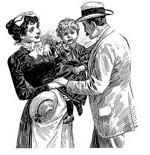
The Family: The Center of Civilization
ON GENERATION X'S WANDERLUST
In our modern world, the nuclear family has supplanted the intergenerational family as the norm, as career mobility has caused more and more families to split into isolated, individual units rather than live closely as an extended family that includes grandparents, aunts and uncles, and cousins. When nuclear families conceive of themselves as detached entities rather than members of a common heritage, a link between the present and the past is broken, and fragmentation and rootlessness follow. The modern man who starts a family faces a choice: either he can give his children a broad liberal education based on the traditions of the past, or he can rely on his own limited, fallible resources to forge a family identity. The new heads of families, known collectively as Generation X, are announcing themselves as unknown beings, disassociated from family, tradition, religion, their past, and their culture. These isolated families and disconnected individuals have turned their backs on the rich inheritance of ethnic identity, traditional wisdom, religious faith, and a civilized, moral way of life. A family can enlarge its world of knowledge by availing itself of its ethnic, cultural, and religious heritage, or it will constrict its life by ignoring its past and detaching itself from these tremendous stores of wisdom.
To be born into a family is to inherit a legacy. A child not only inherits the genetic traits of his mother and father, he also receives a family history, an ethnic culture, and a religious heritage. A child is not born a tabula rasa, a smooth tablet without impressions or marks. The more a child receives by way of tradition, the richer are the resources that allow him to live a civilized life, and the broader is the education he receives. The family is not a laboratory for experimentation but a repository of ancient wisdom accumulated throughout many generations. To remain close to one’s extended family is to steep oneself in a cultural tradition and a storehouse of proverbial wisdom. To know one’s family history is to feel a sense of indebtedness for all that has been transmitted and received from the immediate and distant past. To acknowledge a sense of gratitude for a glorious or noble heritage evokes a sense of humility — one understands that one is but a part of a whole, a single member of an extended, intergenerational family that spans centuries. This sense of family tradition and culture provides rootedness, a stability that allows for the fullness of human development in an environment that clarifies the purpose and meaning of one’s life.
+++
In Homer’s Odyssey, Odysseus returns to his roots, heritage, and culture after a 20-year absence from his home in Ithaca. He could have chosen to remain on the goddess Calypso’s beautiful island paradise, “a spot where even an immortal visitor might pause to gaze in wonder and delight,” and lived in luxury. Calypso would have granted Odysseus the gift of immortality, and he never would have had to suffer the agony of death. But the Greek hero was determined to return to his homeland and his family. His ethnic heritage had instructed him that his first obligation was to uphold his marriage to Penelope, be a father to his son, Telemachus, and care for his devoted father, Laertes, in his old age. Where a person’s treasure lies, there his heart is. Odysseus’s Greek culture and family history dictate his great decision to sacrifice all the pleasures of the goddess’s paradise and return home. The civilized customs and moral ideals of tradition illuminate the meaning of life’s real treasure: the love between family members.
During his travels, Odysseus is welcomed by a hospitable and God-fearing people whose way of life embodies the art of living well. The Phaeacians are civilized, cultured, and intelligent, and they excel in the practical arts of shipbuilding, weaving, and agriculture, and in the fine arts of music and dance. The king of Phaeacia, impressed by the achievements of the illustrious hero, offers to Odysseus the hand of his lovely daughter Nausicaa, whom Odysseus compliments with the highest praise: “Never have I set eyes on such perfection in man or woman. I worship as I look.” If Odysseus had accepted the alluring offer of Nausicaa as his bride, he would have inherited the power and wealth of a king, enjoyed the refined and advanced culture of the Phaeacian people, and been blessed in a marriage to a pure maiden of exquisite beauty. But Odysseus’s heart — and his treasure — lay in his homeland. The indissoluble bonds of affection he shares with his wife, son, father, and people surpass all the wealth, refinement, and beauty offered by the generous king of Phaeacia. Odysseus has no history there, no close bonds of kinship, and he would have felt like an alien even in a civilized country that honored him with all its gracious hospitality.
You May Also Enjoy
Brownson argues that Man grasps the universal only through a particular (and inevitably divisive) set of loyalties, as opposed to a watery eclecticism.
The obituary of this prominent short-story writer and poet read, "I'm a paid-in-full member of the working poor. I have a great deal of sympathy with them. They're my people."
'Queerness' is more than a broad aegis under which to group everything that is not heterosexual. There is a spirit that animates the LGBTQ worldview.

